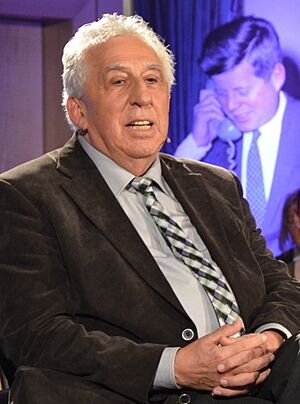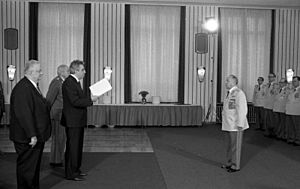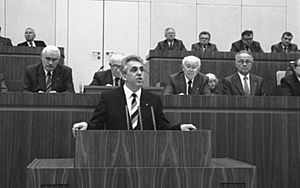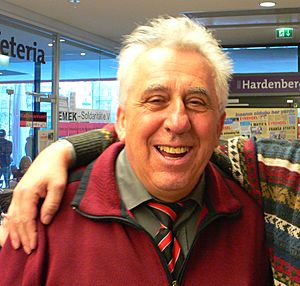Egon Krenz facts for kids
Quick facts for kids
Egon Krenz
|
|||||||||||||
|---|---|---|---|---|---|---|---|---|---|---|---|---|---|
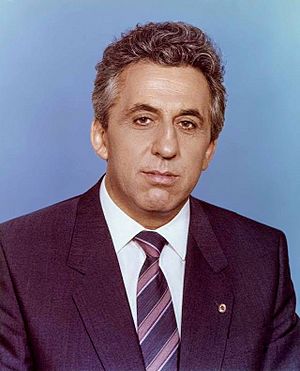
Official portrait, 1984
|
|||||||||||||
| General Secretary of the Socialist Unity Party |
|||||||||||||
| In office 18 October 1989 – 3 December 1989 |
|||||||||||||
| Deputy | |||||||||||||
| Preceded by | Erich Honecker | ||||||||||||
| Succeeded by | Gregor Gysi (as Chairman) | ||||||||||||
| Chairman of the State Council | |||||||||||||
| In office 24 October 1989 – 6 December 1989 |
|||||||||||||
| Preceded by | Erich Honecker | ||||||||||||
| Succeeded by | Manfred Gerlach | ||||||||||||
| Chairman of the National Defense Council |
|||||||||||||
| In office 18 October 1989 – 6 December 1989 |
|||||||||||||
| Secretary |
|
||||||||||||
| Preceded by | Erich Honecker | ||||||||||||
| Succeeded by | Office abolished Manfred Gerlach (as Chairman of the State Council) |
||||||||||||
| First Secretary of the Free German Youth |
|||||||||||||
| In office 9 January 1974 – 1 December 1983 |
|||||||||||||
| Second Secretary |
|
||||||||||||
| Preceded by | Günther Jahn | ||||||||||||
| Succeeded by | Eberhard Aurich | ||||||||||||
| Chairman of the Ernst Thälmann Pioneer Organisation |
|||||||||||||
| In office 8 February 1971 – 9 January 1974 |
|||||||||||||
| Preceded by | Werner Engst | ||||||||||||
| Succeeded by | Helga Labs | ||||||||||||
|
|||||||||||||
| Central Committee Secretariat responsibilities | |||||||||||||
| 1983–1989 | Youth | ||||||||||||
| 1983–1989 | Sports | ||||||||||||
| 1983–1989 | Security Affairs | ||||||||||||
| 1983–1989 | State and Legal Affairs | ||||||||||||
| Personal details | |||||||||||||
| Born |
Egon Rudi Ernst Krenz
19 March 1937 Kolberg, Province of Pomerania, Free State of Prussia, Nazi Germany (now Kołobrzeg, Poland) |
||||||||||||
| Political party | Independent | ||||||||||||
| Other political affiliations |
Socialist Unity Party (1955–1990) |
||||||||||||
| Spouse |
Erika Krenz
(m. 1961; died 2017) |
||||||||||||
| Children | 2 | ||||||||||||
| Residence | Dierhagen | ||||||||||||
| Occupation |
|
||||||||||||
| Awards |
|
||||||||||||
| Signature | |||||||||||||
| Criminal information | |||||||||||||
| Criminal status | Served prison sentence 13 January 2000 – 18 December 2003, released on parole until 2006 | ||||||||||||
| Conviction(s) | Manslaughter (4 counts) | ||||||||||||
| Criminal penalty | 6½ years imprisonment | ||||||||||||
|
Central institution membership
1983–1989: Full member,
Politburo of the Central Committee 1976–1983: Candidate member, Politburo of the Central Committee 1973–1989: Full member, Central Committee 1971–1973: Candidate member, Central Committee Other offices held
1985–1989: Member,
National Defence Council 1984–1989: Deputy Chairman, State Council 1981–1989: Member, State Council 1971–1976: Volkskammer Chairman, Free German Youth |
|||||||||||||
| Leader of East Germany | |||||||||||||
Egon Rudi Ernst Krenz, born on March 19, 1937, is a German former politician. He was the last Communist leader of East Germany during a time of big changes in 1989. He took over from Erich Honecker as the head of the ruling Socialist Unity Party of Germany (SED). However, he had to step down just weeks later when the Berlin Wall fell.
Throughout his career, Krenz held many important jobs in the SED. He was Honecker's second-in-command from 1984 until he became leader in 1989. This happened during many protests against the government. Krenz tried to keep the Communist government in power, but he was not successful. The SED gave up its power a few weeks after the Berlin Wall came down. Krenz was then forced to resign soon after. He was removed from the SED's new party on January 21, 1990. After his release from prison in 2003, he moved to the town of Dierhagen. He was on parole until his sentence ended in 2006. Krenz is one of the last former leaders from the Eastern Bloc who is still alive.
Contents
Early Life and Beginnings
Krenz was born in Kolberg, which was part of Nazi Germany at the time. Today, this area is in Poland. In 1945, his family moved to Damgarten during the time when many Germans were moving from Poland after World War II.
Rising in East German Politics
Krenz trained as a teacher and worked as a journalist when he was young. He joined the Free German Youth (FDJ) in 1953 as a teenager. He then joined the Socialist Unity Party of Germany (SED) in 1955. After serving in the army from 1959 to 1961, he went back to the FDJ. He studied at a special Communist Party school in Moscow for three years. By 1967, he had a degree in social science.
During his career, Krenz held many roles in the SED and the government. He led the Ernst Thälmann Pioneer Organisation from 1971 to 1974. In 1973, he became a member of the party's central committee. He was also a member of the Volkskammer (East Germany's parliament) from 1971 to 1990. From 1974 to 1983, he led the communist youth movement, the Free German Youth.
In 1983, he joined the Politburo, a very important group in the party. He became the Secretary for Security, Youth, and Sport. This was the same job Honecker had before becoming the main leader. Krenz became very important when he became Honecker's deputy in 1984. This made him the second most powerful person in East Germany. Many people thought Honecker was preparing him to take over.
Becoming Leader of East Germany
After many protests against East Germany's communist government, the SED Politburo decided to remove Honecker. This happened on October 18, 1989. Krenz was then chosen as the new General Secretary of the SED. Krenz had been asked earlier about replacing Honecker. He was hesitant because he saw Honecker as his "foster father and political teacher." He wanted to wait until Honecker, who was very ill, passed away. But by October, he realized the situation was too serious to wait.
Despite the protests, the Volkskammer elected Krenz to Honecker's main state jobs. He became the Chairman of the State Council of East Germany, which was like being president. He also became the Chairman of the National Defence Council, making him the commander-in-chief of the army. This was only the second time in the Volkskammer's history that a vote was not unanimous.
In his first speech as leader, Krenz promised to make the government less strict. He also promised democratic changes. However, many East Germans did not believe him. They remembered that he had thanked Deng Xiaoping after the 1989 Tiananmen Square protests just months before. In Honecker's resignation speech, he named Krenz as his replacement. This made it seem like the change was not democratic. Because of this, Krenz was almost as disliked as Honecker. Thousands of East Germans protested, demanding his resignation.
On the same day he took office, Krenz received a secret report. It showed that East Germany was in a deep economic crisis. The country was DM123 billion in debt and could not pay its foreign loans. Honecker had kept the true state of the economy a secret from Krenz. Krenz had to ask West Germany for a loan. But West Germany would only consider talks if the SED gave up power and allowed free elections. Krenz was not ready to agree to this.
Krenz did not truly intend to open up the government. While he talked about making travel easier, he also ordered the rejection of a group called New Forum from becoming an approved organization. Before a big protest on November 4, he told the Stasi (secret police) to stop anyone trying to cross the border by force.
On November 7, Krenz approved the resignation of Prime Minister Willi Stoph and his entire cabinet. Two-thirds of the Politburo also resigned. However, the Central Committee voted Krenz back as General Secretary. Krenz gave a speech where he criticized Honecker. But by this point, events were moving too fast for him to control.
Despite promises of change, public opposition grew. To try and calm things, Krenz allowed the border with Czechoslovakia to reopen. It had been closed to stop East Germans from fleeing to West Germany. The new Politburo agreed to new rules for trips to the West.
The Berlin Wall Opens
On November 6, the Interior Ministry released a draft of new travel rules. It seemed like a big change, but it only made small adjustments to the old rules. It still took a long time to get approval for travel. Applications could be denied for many reasons. Also, there was no guarantee that people traveling abroad would get foreign money. This draft made ordinary citizens very angry.
At a Politburo meeting on November 7, it was decided to immediately put into effect the part of the travel rules about moving away permanently. The plan was to create a special border crossing for this. However, the officials working on the new rules found this was not possible. They wrote a new text that allowed both permanent emigration and temporary travel. It said that East German citizens could apply to travel abroad without the old requirements. It also allowed people to move permanently through all border crossings, including those in Berlin.
The new rules were finished on November 9. But no one told Günter Schabowski, the Politburo's spokesman, that the rules would start the next afternoon. So, at a press conference, when a reporter asked when the rules would begin, Schabowski thought they were already in effect. He replied, "As far as I know—immediately, without delay." Parts of the press conference were shown on West German television, which most East Germans could watch. This caused thousands of East Berliners to rush to the Berlin Wall. They believed the border crossings were open. Krenz and the other leaders did not want to order the use of deadly force. Finally, the border guards, who were not prepared and outnumbered, let the crowds pass into West Berlin.
The fall of the Berlin Wall greatly weakened Krenz and the SED. On November 18, Krenz swore in a new government. It was clear the SED's time was almost over. The CDU and the LDPD, who had long followed the SED, removed their pro-Communist leaders. They announced they were leaving the National Front. The new CDU leadership demanded Krenz resign from his state leadership roles.
On December 1, the Volkskammer changed the East German constitution. They removed its Communist parts. For example, the article that said East Germany was a socialist state led by the SED was deleted. Two days later, the entire Politburo and Central Committee, including Krenz, resigned. A working committee took over the party. On December 6, 1989, Krenz resigned from his remaining leadership jobs. He was replaced as head of state by Manfred Gerlach. To try and improve its image before East Germany's first free election, the new party that replaced the SED, the Party of Democratic Socialism, expelled Krenz and other former leaders in 1990.
Life After Leadership
In 1997, Krenz was sentenced to six and a half years in prison. This was for his role in the deaths of four Germans who tried to escape East Germany over the Berlin Wall. He was also charged with other offenses, including electoral fraud.
He appealed the decision, saying that the laws of the newly reunited Germany should not apply to events that happened in East Germany. Krenz also argued that prosecuting former East German officials went against an agreement between West German Chancellor Helmut Kohl and Soviet President Mikhail Gorbachev. This agreement was made during talks that led to German reunification. However, the court upheld the verdict in 1999. Krenz called his conviction "victor's justice" and "cold war in court." He said, "The victorious power is getting revenge on the representatives of the defeated power."
Krenz began his prison sentence in Hakenfelde Prison. He was later moved to Plötzensee Prison. He was released from prison in December 2003 after serving almost four years. He then quietly retired with his wife Erika (who passed away in 2017) to Dierhagen. He remained on parole until his sentence officially ended in 2006.
Later Years and Views
Krenz lives in Dierhagen, a town on the Baltic Sea coast. Unlike some other former high-ranking members of the SED, Krenz still defends East Germany. He says he has not changed his political views.
Krenz speaks Russian fluently. He has praised Russian president Vladimir Putin, saying it is "a great fortune for Russia that it has Putin" after weaker presidents. He believes the Cold War never truly ended. He is a Russophile and is seen by some as a symbol of Ostalgie, which is a longing for things from former East Germany.
During the Russian invasion of Ukraine, he has supported peace talks. He has also opposed Germany and other Western countries sending weapons to Ukraine. He has called for an end to all sanctions against Russia. He has also praised China, saying that "absolute poverty has been eliminated" there.
In October 2024, Krenz gave a speech to celebrate the 75th anniversary of East Germany's founding. In his speech, he defended East Germany and its history. He said, "Despite everything, the GDR proved in the center of Europe that life without capitalists was possible even in highly industrialized Germany."
See also
 In Spanish: Egon Krenz para niños
In Spanish: Egon Krenz para niños
 | Kyle Baker |
 | Joseph Yoakum |
 | Laura Wheeler Waring |
 | Henry Ossawa Tanner |


